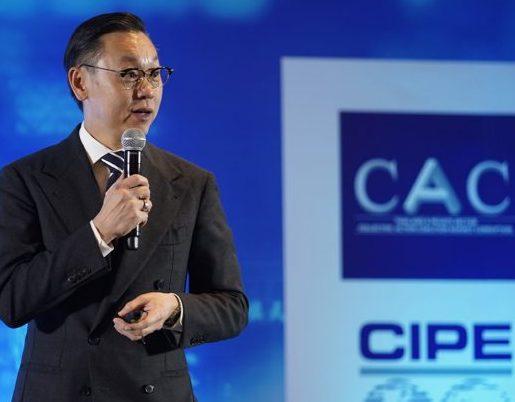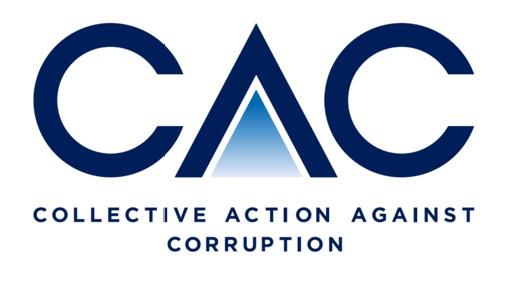
FAQ
CAC
Thailand’s Private Sector Collective Action against Corruption (CAC) is an initiative by the Thai private sector to take parts in tackling corruption problem via collective action. The CAC aims to bring effective anti-corruption policy and mechanism into implementation by companies in order to create an ecosystem of clean business community.
The CAC was co-founded by the country’s eight leading organizations in the private sector including the Thai Chamber of Commerce, the Joint Foreign Chambers of Commerce in Thailand, the Thai Listed Companies Association, the Federation of Thai Industries, the Federation of Thai Capital Market Organizations, the Thai Bankers’ Association, the Tourism Council of Thailand, and the Thai Institute of Directors Association (IOD), which also serves as its secretariat and takes a leading role in driving the program. The CAC’s operations are sponsored by U.S-based Center for Private Enterprise (CIPE) and the U.K. Prosperity Fund.
CAC is founded and represented solely by private companies and is not part of any government organizations.
CAC is funded by sponsorships from private companies and Center for Private Enterprise (CIPE)
CAC reviews members’ checklist documentations and provides certification based on published standards derived from Transparency International guidelines. CAC do not certify the behaviors of the employees nor that the companies will not engage in bribery.
The CAC works in parallel and coordinates closely with the government’s National Anti-Corruption Commission (NACC) and the Anti-Corruption Organization (Thailand), which handles the civil society front. Moreover, the CAC also exchanges anti-corruption knowledge and experiences with international agencies regularly.
How to Join
• Companies wishing to join CAC starts with registering and submitting Declaration of Intent online via CAC’s website. The Declaration of Intent needs to be signed by the Chairman of the Board.
• CAC will process the submitted Declaration of Intent and will reply within approximately 2 weeks.
• There is no cost to Declare Intentions.
A Declaration of Intent is a document outlining the declaration of SMEs to support the coalition in reducing corruption and responsibilities that the company will agree to accept. The Declaration of Intent also outlines the working principles of CAC as well the Incident Management process.
Companies are required to have their Chairman of the Board sign the Declaration, which will also kick off the 18 months preparation process for certification. A sample of the Declaration of Intent can be found here.
Declaration is the first step in getting certified as a CAC member. It formally communicates the intention of the company to participate in the Coalition. The Declaration also kicks off the 18-month deadline for companies to submit documents to CAC for Certification.
For SMEs, this 18-month deadline also includes having the assigned Independent Auditor review and approve all 17 checklist documents.
The Declaration sample can be viewed in Join Us page under Process Overview. After registering, members will be able to download the Declaration of Intent for signature.
Companies that have submitted the Declaration of Intent will have 18 months to apply for certification. If the company cannot submit checklist documents within 18 months, the company will be given a “Blackout” status and will have to wait 6 months to re-submit the Declaration of Intent.
The signature of the company’s Chairman of the Board is required.
CAC will certify companies based on the individual business entity. Therefore, each of the companies, affiliates or subsidiaries must submit their own Declaration of Intent and documentation for certification. However, the companies may use the same auditing committee or external auditors.
Once companies submit the Declaration of Intent, they will have 18 months to decide, prepare and submit documents for certification. If the company chooses not to apply for certification or cannot submit documentation within 18 months, the company will be given a “Black out” status. Companies with Black out status must wait 6 months before rejoining.
Certification
Companies will have 18 months starting from the Declaration date until all documents are approved by the Independent Auditor and submitted to CAC. Exceptions may be granted on a case-by-case basis.
Companies can check their submission deadline on CAC’s website. The 18-month duration is calculated based on calendar days and includes public holidays.
Companies can submit checklist documents after submitting the Declaration of Intent until the 18 months deadline. CAC will review the documents quarterly and the cut of period for each quarter is the 15th of last month of each quarter e.g. 15th of March, 15th of June, 15th of September and 15th of December.
CAC may grant a one-time 6-month extension. If after the 6-month extension, the company still cannot submit the documents, the company will be given “Blackout” status and will be required to wait 6 months before re-submitting the documents.
Currently, companies can send electronic documents in CD-ROM or USB/flash drive together with a signed copy of the self-evaluation form to CAC for certification. Hard copies of the supporting documents will NOT be accepted and will be returned.
For large companies using 71 checklists, the expense is 8,000 baht, which is due after all the documents have been submitted to CAC.
SMEs will have the expense of contracting their own Independent Auditors to verify the checklist documents. CAC estimates work to be between 3-5 days depending on the complexitythe business and the quality of the prepared documents. This may translate to about 25,000-50,000 baht in fees.
CAC also charges 4,000 baht for SME certification, which covers the manhours for CAC staffs to review the submitted documents, for CAC Certification Committee to certify the submission and for upkeep of the website used for document submission/e-learning. Once SMEs have uploaded the documents, SMEs can email CAC to issue an invoice for payment.
No, but CAC hosts Road to Certify events, which Company representatives can attend and ask questions about document preparation.
CAC will announce the result of the company’s submission within the following quarter unless the documents are found to be insufficient according to CAC’s guidelines. Companies will be notified to make a one-time correction and resubmit. If the resubmission still does not meet CAC’s requirements, the company will have to make changes and wait for certification in the proceeding quarter (as long as the timing do not exceed the 18 months deadline).
Certification from CAC is good for 3 years. Companies that would like to renew will have to submit checklist documents no later than 3 months before the deadline of expiration. Renewing companies do not have to resubmit their Declaration of Intent.
Checklist
Currently, companies can send electronic documents in CD-ROM or USB/flash drive together with a signed copy of the self-evaluation form to CAC for certification.
Hard copies of the supporting documents will NOT be accepted and will be returned.
Yes, for clarity, the Anti-corruption policy needs to be separated.
Yes. In order to align the organization with the (new) procedures, approval from the Board must be received. Requesting approval will also help raise awareness of the Board and management on the new procedures and related activities.
Companies will need to first assess risks with bribery and corruption that may result from the business or operational activities. Only bribery and corruption risks are to be submitted and not fraud, compliance or asset misappropriation risks. After the risks are identified, each of the risks must be scored in terms of Impact and Likelihood. The overall risk score is then calculated and used to rank for high risks.
การจัดทำกระดาษทำการ (Working Paper) เป็นการสอบทานความเพียงพอของมาตรการต่อต้านการคอร์รัปชันที่องค์กรมี เพื่อให้ผู้บริหารและคณะกรรมการได้มั่นใจว่ามาตรการต่อต้านการคอร์รัปชันขององค์กรมีประสิทธิภาพประสิทธิผล และสามารถปฏิบัติได้จริง
สำหรับบริษัทที่ยื่นขอรับรองกับ CAC ครั้งที่ 3 และ บริษัทสามารถแนบเป็นเอกสารอ้างอิงใน Checklist ข้อที่ 71 ได้เลย
Change
Once CAC has approved certification, CAC will invite representatives from the company to attend CAC’s award ceremony, which is held twice per year.
The role of CAC certified companies is to continue monitoring the established risks and controls to make sure they are current and effective towards current and new risks. New controls must be approved and communicated accordingly. Companies need to apply for recertification 3 months prior to the 3-year expiration.
CAC Change Agent คือ โครงการพิเศษที่แนวร่วมต่อต้านคอร์รัปชันของภาคเอกชนไทย (CAC) เชิญชวนบริษัทที่ผ่านการรับรองกับ CAC และให้ความสำคัญกับการขยายเครือข่ายธุรกิจโปร่งใสไปยังบริษัทคู่ค้า โดยการสนับสนุนให้บริษัทคู่ค้าของตนเข้าร่วม CAC ในโครงการรับรอง SME ซึ่งปัจจุบันมีบริษัทที่เข้าร่วมเป็น Change Agent มากกว่า 20 บริษัท สามารถดูข้อมูลเพิ่มเติมได้ ที่นี้(โครงการ CAC Change Agent)และใบสมัครเข้าร่วมโครงการ CAC Change Agent คลิก
SMEs only
Yes, if your company meets the 3 SME criteria. Your company does not need to resubmit the Declaration of Intent. However, the 18-month deadline will still be the same, starting from the original Declaration date.
No, the use of CAC’s online Anti-bribery training is optional and free. However, if the companies wish to organize in-house training themselves, CAC recommends that the training topics cover our outline SME Anti-bribery toolkit page 58
The SME Certification Program was launched in January 2018. The first SME Executive Briefing was held on 14th February 2018.
SMEs by CAC definition are companies that
- Are not listed in the Stock Exchange of Thailand
- Are not under control of companies listed on the Stock Exchange of Thailand and
- Have annual revenue less than 1 billion baht.
Yes, SMEs have the option to choose between the 71 checklist certification for large companies or the 17 checklist certification for SMEs.
For the SME Certification, CAC will accept auditors with one of the following qualifications. Any auditors that meet any of these qualifications must enroll and pass CAC’s Independent Auditor training first.
- Head of audit committee, who will represent and approve submissions on behalf of the audit committee. The audit committee members must meet S.E.C. qualifications
- Accounting auditors that have been assigned in the current/previous year
- Accounting auditors that have been approved by the S.E.C.
- Internal auditors with the following certifications:
- Certified Internal Auditor (CIA)
- Certified Professional Internal Auditors (CPIAT)
Note: Independent Auditors in 2. and 4. must submit evidence of qualification to CAC prior to attending CAC Internal Auditor Training.
The training is focused on helping the auditors understand the 17 checklist requirements in detail and how to assess the submitted documents online using CAC’s website.
The cost to attend the training is 5,000 baht.
